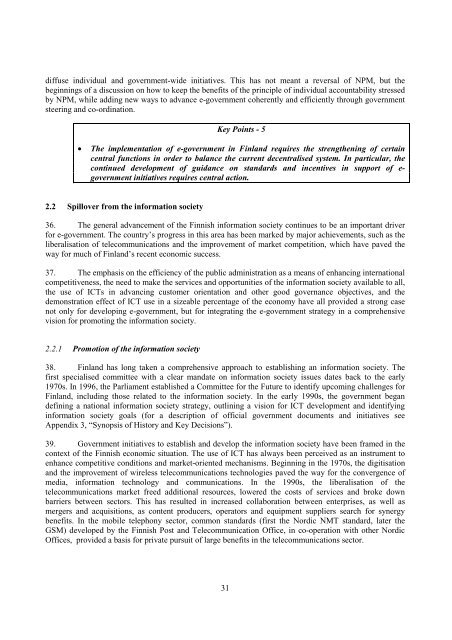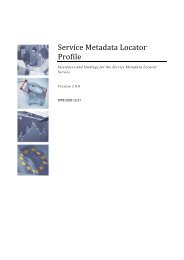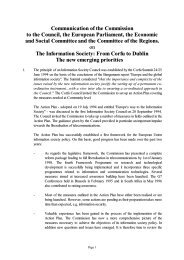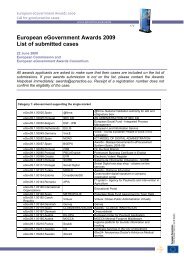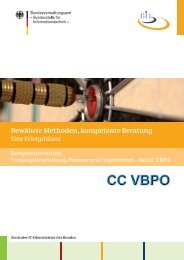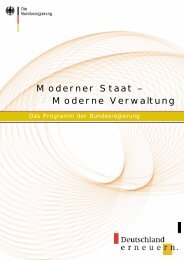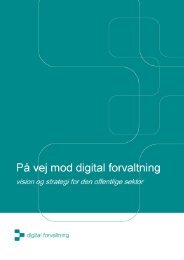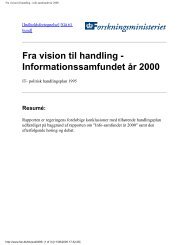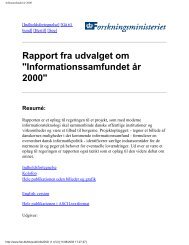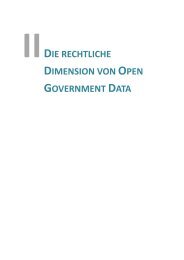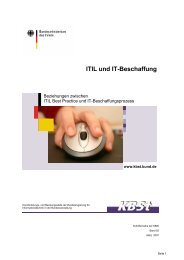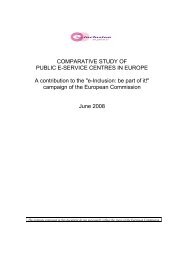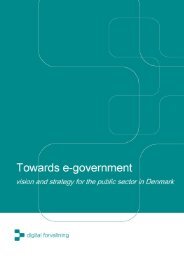e-GOVERNMENT IN FINLAND - ePractice.eu
e-GOVERNMENT IN FINLAND - ePractice.eu
e-GOVERNMENT IN FINLAND - ePractice.eu
You also want an ePaper? Increase the reach of your titles
YUMPU automatically turns print PDFs into web optimized ePapers that Google loves.
diffuse individual and government-wide initiatives. This has not meant a reversal of NPM, but the<br />
beginnings of a discussion on how to keep the benefits of the principle of individual accountability stressed<br />
by NPM, while adding new ways to advance e-government coherently and efficiently through government<br />
steering and co-ordination.<br />
Key Points - 5<br />
x The implementation of e-government in Finland requires the strengthening of certain<br />
central functions in order to balance the current decentralised system. In particular, the<br />
continued development of guidance on standards and incentives in support of egovernment<br />
initiatives requires central action.<br />
2.2 Spillover from the information society<br />
36. The general advancement of the Finnish information society continues to be an important driver<br />
for e-government. The country’s progress in this area has been marked by major achievements, such as the<br />
liberalisation of telecommunications and the improvement of market competition, which have paved the<br />
way for much of Finland’s recent economic success.<br />
37. The emphasis on the efficiency of the public administration as a means of enhancing international<br />
competitiveness, the need to make the services and opportunities of the information society available to all,<br />
the use of ICTs in advancing customer orientation and other good governance objectives, and the<br />
demonstration effect of ICT use in a sizeable percentage of the economy have all provided a strong case<br />
not only for developing e-government, but for integrating the e-government strategy in a comprehensive<br />
vision for promoting the information society.<br />
2.2.1 Promotion of the information society<br />
38. Finland has long taken a comprehensive approach to establishing an information society. The<br />
first specialised committee with a clear mandate on information society issues dates back to the early<br />
1970s. In 1996, the Parliament established a Committee for the Future to identify upcoming challenges for<br />
Finland, including those related to the information society. In the early 1990s, the government began<br />
defining a national information society strategy, outlining a vision for ICT development and identifying<br />
information society goals (for a description of official government documents and initiatives see<br />
Appendix 3, “Synopsis of History and Key Decisions”).<br />
39. Government initiatives to establish and develop the information society have been framed in the<br />
context of the Finnish economic situation. The use of ICT has always been perceived as an instrument to<br />
enhance competitive conditions and market-oriented mechanisms. Beginning in the 1970s, the digitisation<br />
and the improvement of wireless telecommunications technologies paved the way for the convergence of<br />
media, information technology and communications. In the 1990s, the liberalisation of the<br />
telecommunications market freed additional resources, lowered the costs of services and broke down<br />
barriers between sectors. This has resulted in increased collaboration between enterprises, as well as<br />
mergers and acquisitions, as content producers, operators and equipment suppliers search for synergy<br />
benefits. In the mobile telephony sector, common standards (first the Nordic NMT standard, later the<br />
GSM) developed by the Finnish Post and Telecommunication Office, in co-operation with other Nordic<br />
Offices, provided a basis for private pursuit of large benefits in the telecommunications sector.<br />
31


